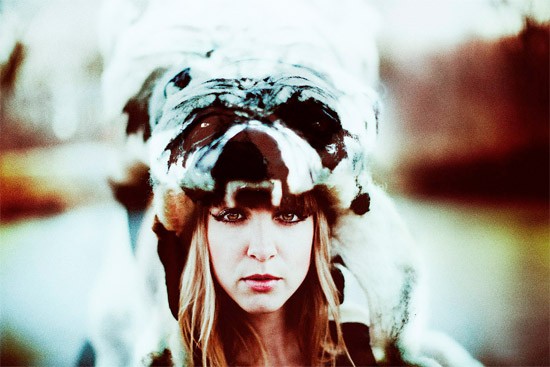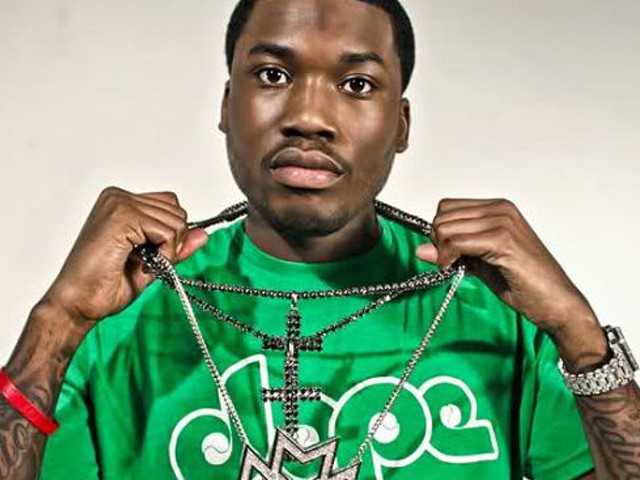As we slouch or saunter into a second decade of war, one that isn't really winding down at all -- it's just taking to the skies, led by robots, or being brazenly waged on women and working people right here at home - we need more albums like Generals by the Mynabirds. As conceived by Laura Burhenn, the Mynabirds is both band and recording project. In the studio, Burhenn collaborates with producer and multi-instrumentalist Richard Swift, forming a duo that works together like a platoon rattling off rounds of militant percussion, pop piano-lines and synthesized hooks, all aimed at the machinery of deceit and conformity that makes any war possible. Generals is political pop music at its best, always fierce and adventurous, but beautiful and lyrical as the personal and collective freedom Burhenn still believes is possible.
The Mynabirds makes its first appearance in St. Louis on July 1 at the Firebird. I reached Burhenn on the phone after a gig in Chicago, which, despite being "really groovy," resulted in the theft of her signature fox headdress. Fools really shouldn't fuck with her.
Roy Kasten: What kind of twisted person would steal a fox headdress?
Laura Burhenn: Right? It was probably just some drunk kid who thought it would be funny. I felt like such an old lady: "Young man! That cost a lot of money and took someone a lot of time to make!" It's not real fox. It's felt. But it's something that took the designer weeks to make. It's not like stealing a CD, which is mass-produced.
Should I put out an APB on Twitter?
Oh, it's back. Our guitarist chased the guy for six blocks.
You worked with Richard Swift again on this album. Can you talk a little bit about how your relationship with him has changed?
It's funny. When I went in to record the new record with him, I was worried at first. We had such a good time on the first album. How are we going to recreate the magic? But since then we've become really great friends. He toured with the Mynabirds, and with Bright Eyes. It was like going to hang out with your best friend. We felt comfortable experimenting in new ways.
As a producer, he seems like he would be a strong voice. How do you reconcile differences?
I trust his musical choices 100%. I'm a great fan of his music. His work with sounds is some of the greatest of our generation, for sure. That's the starting point. But when I have ideas he is very much excited to make them work. I don't have the best musical vocabulary. I'm not an engineer. I'll say things like, "Can we have less seagull in that song?" He was willing to go down every path I wanted to go down. And we're both good at telling each other when things don't work.
Electronics are a stronger presence on this album, though you still seemed interested in what a live band can do in the studio.
In the studio it was just Richard and I together. But there are a lot layers. As much fun as it can be to create an electronic dance-pop song, you want to give it a live sense in the studio.
It's also a deliberately political record, and part of what's interesting about that is how you criticize the state of the nation from various angles, like you're looking at it through a prism, not just a magnifying glass.
Absolutely. People ask, "This is a protest record, but what is she protesting?" For me, there are so many pieces to the puzzle, so many problems to solve, where do you begin? How do you divide that and make it digestible? My mom says, "How do you eat an elephant? One bite at a time." For me, there are generalities, which is sort of the double entendre of the album title, but at some point it needs to get specific and personal.
And politics have a poetic dimension, so on a song like "Disarm" it's the war that's going on inside as much as outside.
Absolutely.
Your audience may share your political views, but they may not share the sense of urgency that runs through the record.
The sense of urgency? I definitely had that in mind, but I can see why that wouldn't be on the minds of other people. Our lives can be comfortable. Grander political issues don't necessarily touch our daily lives. The socially-conscious pop song is something that I have a great love of. A Michael Jackson song can make you want to dance and make you want to think about big issues in a very simple way. That's important. That's something I'd like to see more of in Top 40 for sure.
Can you talk about your photography project, "The New Revolutionists"?
To be clear, I didn't take any of the photos. I was thinking about album art; I was thinking about the portraits of Richard Avedon, especially one portrait called "Generals of the Daughters of the American Revolution." And I was thinking about new American revolutionaries, revolutionary women. I wanted to have the album art reflect that, the Avedon-style, classic portrait, black and white, but to have them be these almost warrior portraits -- as if a woman were going on trail for everything she believes in. And once we started shooting the first round, it was clear it needed to be a bigger project. We turned it into a nominative project. I'm lucky to have had so many women featured so far.
There's great power in the portraits, especially to see them in a series, one after another. There's a real starkness.
That was the aim, to strip away. I wanted it to contrast the faces we see so often, you know, the whole celebrity culture. I wanted there to be a different image of women out there.






